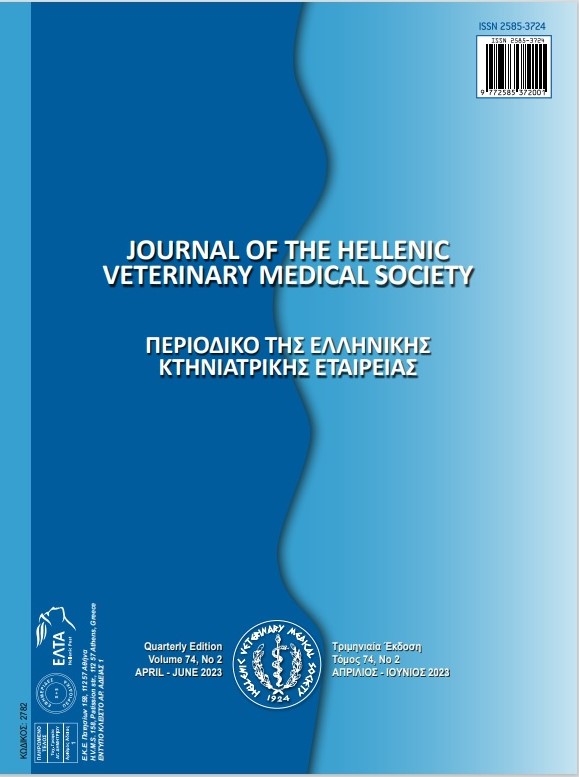A comparative study on oxidative stress indices among cattle and buffalo with foreign body syndrome

Abstract
This study compared the oxidative stress indices in cattle and buffalo with foreign body syndrome (FBS). The study included 60 animals (32 buffalo and 28 cows). The animals were divided into the control group (10 healthy cows and 10 healthy buffalo). The diseased animals were divided based on the clinical signs and duration of illness as well as radiographic and ultrasonographic findings into the chronic traumatic reticuloperitonitis (TRP) group (13 cows and 12 buffalo), acute TRP group (5 buffalo), and traumatic pericarditis (TP) group (5 cows, 5 buffalo). Full case histories were obtained, and thorough clinical examinations were performed. Blood samples were obtained for hematological and biochemical analysis. The malondialdehyde (MDA) level and superoxide dismutase (SOD) activity increased in all diseased animals’ groups, while the reduced glutathione (GSH) activity significantly decreased in all diseased animals’ groups than in the control group. The glutathione peroxidase (GSH-PX) activity increased dramatically in cows with chronic TRP and significantly decreased in buffalo with chronic TRP and not significantly changed in the groups with acute TRP and TP. The catalase activity only increased in buffalo with TP. The total antioxidant capacity increased significantly in cows with chronic TRP and buffalo with acute TRP, indicating oxidative stress with the compensated antioxidant mechanism. Finally, both cattle and buffalo with acute and chronic TRP and TP showed an existing antioxidant capacity despite oxidative stress. There was a significant difference between cattle and buffalo in their response to oxidative damage, in which buffalo with chronic TRP showed a decompensation of the antioxidant capacity leading to chronic damage and fibrosis.
Article Details
- How to Cite
-
Gomaa, N., Nassif , N., Havez, M., & Fawzy, S. (2023). A comparative study on oxidative stress indices among cattle and buffalo with foreign body syndrome. Journal of the Hellenic Veterinary Medical Society, 74(3), 5903–5910. https://doi.org/10.12681/jhvms.28170 (Original work published October 16, 2023)
- Issue
- Vol. 74 No. 3 (2023)
- Section
- Research Articles

This work is licensed under a Creative Commons Attribution-NonCommercial 4.0 International License.
Authors who publish with this journal agree to the following terms:
· Authors retain copyright and grant the journal right of first publication with the work simultaneously licensed under a Creative Commons Attribution Non-Commercial License that allows others to share the work with an acknowledgement of the work's authorship and initial publication in this journal.
· Authors are able to enter into separate, additional contractual arrangements for the non-exclusive distribution of the journal's published version of the work (e.g. post it to an institutional repository or publish it in a book), with an acknowledgement of its initial publication in this journal.
· Authors are permitted and encouraged to post their work online (preferably in institutional repositories or on their website) prior to and during the submission process, as it can lead to productive exchanges, as well as earlier and greater citation of published work.


